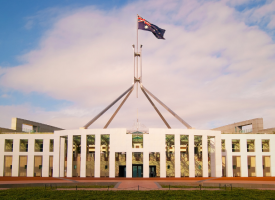Transcript - Dr Gannon - 2CC - Reflections on the AMA Presidency
Transcript: AMA President, Dr Michael Gannon, 2CC, Breakfast with Tim Shaw, Wednesday 23 May 2018
Subject: Reflections on the AMA Presidency
TIM SHAW: What's it like to put your hand up to become the President of the Australian Medical Association? You're running a successful obstetric and gynaecological practice in Western Australia, but Michael Gannon was elected as President of the Australian Medical Association on 29 May 2016. He's hanging up his boots ahead of the National Conference. There'll be an election for the appointment of the new President of the AMA, and I just thought it'd be timely to catch up with Dr Gannon. One of my first questions at the National Press Club of Australia was to Dr Gannon, and it was all about Dr Google, the number of Australians that were actually using technology to find out more, and in some respects, I guess, in many respects, education is the greatest gift of all, and patients trying to educate themselves maybe ahead of the doctor's appointment, or is it because they can't afford to go to the doctor? In a far-reaching interview right now, I thought we'd catch up with Michael and get a sense of how he feels and what he feels he's achieved during his Presidency of the Australian Medical Association. He's on the line.
Dr Google, good morning. Oh, I'm sorry, Dr Gannon.
MICHAEL GANNON: Good morning, Tim, how are you?
TIM SHAW: Good. Do you remember that question? I said to you: how's Dr Google going? Do you recall your answer?
MICHAEL GANNON: Oh look, I don't think my answer would have changed, and that is that doctors needn't fear patients seeking additional information. I think we've moved a long way in society past doctor knows best. In fact, in society, I think there's a lot of questioning of a lot of institutions and a lot of the professions, and that's not always healthy. It's very hard to get perspective. So doctors use the internet frequently to glean information. If patients know the right place to look, they might find it as well. What doesn't work is plugging symptoms into a search engine. In my experience, it always ends up being something dire and horrible, and it rarely is.
TIM SHAW: Yeah. No, fair statement, and I think that sense of, gee, I feel- these are my symptoms and then suddenly I'm going to self-medicate: not the right answer. That's why we have men and women right around Australia such as yourselves who are trained experts in the field of medicine.
Tomorrow at the National Press Club, interesting conversation: your health in your hands, the digital evolution of health care in Australia. The access to private medical records. Are you an opt in or an opt out? Do you believe patients, if they're concerned about privacy, need to be given that opt out choice or should it be opt in?
MICHAEL GANNON: Well, I think we're getting used to the decision that governments made, that after a trial of opt in, we're moving to opt out. So, there'll be more information on that available, but basically in coming months every Australian will have a MyHealth Record created for them unless they go out of their way to opt out. There's a lot of detail still to be worked through. It's of great concern to me that we as a nation have invested well north of a billion dollars in this project, still with not a great deal to show for it.
TIM SHAW: Yeah. No, fair statement. What's the AMA's position? Are you in favour of doctors all over Australia having access to private medical records so that you can best treat that patient with as much information, if not all of their medical records, at your fingertips at that time?
MICHAEL GANNON: Well look, that's an important point and you're right. We do support it and we understand the privacy concerns, but we think that this is a positive move forward. What happens every day around Australia is that a doctor in private rooms or in a private hospital, a GP, another specialist, maybe in a public hospital, goes looking for a test result, and because it's just too hard to find, they will often repeat that test. Now if we're talking about a biochemical test, if it's another blood test, that's going to cost the community. Taxpayers pick up the vast majority of pathology bills in Australia. But if we're talking about diagnostic imaging, especially if we're talking about x-rays or CT scans, there's a radiation dose in that, so there's even potentially some harm.
So we think the electronic health record is the future. We think that it will reduce the chance of allergic and other anaphylactic reactions. It will enable people to put advance care plans on their health records so that if they are in the context of end of life care, or perhaps even more importantly, in the context of patients with fluctuating competence. So the patients who might be able to make decisions about their health care at one time of the day or one time of the week, but the nature of their disease process is that at other times they're not. So in a whole number of areas it will make the health care of Australians better, more efficient and safer, but there's still a lot of detail to be worked through.
TIM SHAW: Yeah. Let's talk the politics of medicine. The AMA, led by [audio cuts] Victoria's choice to introduce voluntary euthanasia. The politics of that debate: do you find it difficult that on the one hand, as a trained obstetrician, gynaecologist, you've suddenly got to beat the political pathway towards saying to Australians, particularly Victorians in that very contested debate? Were you disappointed Victoria voted yes?
MICHAEL GANNON: Look, I was disappointed Victoria voted yes, and the AMA's position is that doctors should not involve themselves in interventions that have as their primary purpose the ending of a patient's life. Now, of course, there's a lot of doctors who don't agree with that statement, and there's a lot of AMA members who don't agree with that statement, but it was worked up over a period of time. It reflected, in many ways- well, it reflected, in many ways, existing policy and existing ethical statements that go back 2500 years. This issue remains live in other parts of Australia. In my home state of Western Australia, there is a Parliamentary inquiry. I have little doubt it will recommend a euthanasia bill of sorts like the Victorian inquiry. It's stacked full of people who have just made public statements that they favour this change in society. Our [indistinct] …
TIM SHAW: [Interrupts] Don't tell me there's stethoscope stacking in some AMA branches. Is that what you're telling me, Dr Michael Gannon?
MICHAEL GANNON: No, no, I'm talking about the Parliamentary Inquiry …
TIM SHAW: Yeah, alright.
MICHAEL GANNON: … in Western Australia. But no stethoscope stacking. Well, we've got a Presidential election on Sunday [indistinct] …
TIM SHAW: Yes, you have.
MICHAEL GANNON: … yeah, three of my candidates are standing. I know all three of them. All three are currently members of the AMA's 30-odd member Federal Council. I haven't anointed any one of them, but there's no branch stacking that decides exactly who gets elected.
TIM SHAW: Not a woman amongst them though, Michael Gannon.
MICHAEL GANNON: No, I'm pleased to say we have two women running for the position of Vice President, but that is something that the AMA needs to face up to. We have an extremely poor record when it comes to female Presidents. One in Western Australia ever, two in New South Wales in over 100 years, not many that I can recall in Queensland. It's something we need to do better on. It will naturally flow as a higher and higher proportion of the, if you like, 40- to 55-year-old age group, that to a large extent dominates the AMA's Councils, become female.
As you probably know, more than half of medical students are female, more than half of interns are female. We will see that flow through. We try hard to encourage diversity of all different forms when it comes to AMA Councils, but we need to do better.
TIM SHAW: Yeah, look, I've got a terrific doctor here in Canberra at Franklin, but very busy practice from time to time. Pharmacists in the ACT want to be able to administer trivalent and quadrivalent for trivalent flu shots. You know, that's the super duper for the older Australians. Does the AMA still maintain that doctors are the best equipped to give flu vaccines? But not everyone in Canberra's got 70 or 80 bucks to go and see their local GP. What's the answer here?
MICHAEL GANNON: Well, you raised a couple of interesting points there, Tim, because many times over the journey I've been speaking to those in power about bulk billing rates around Australia, and they look at me incredulously about what I'm saying. Well, the truth is that bulk billing rates in Canberra are, I'm pretty sure, the lowest in Australia, and that means that it's commonplace for people to have to see the doctor. I think that if what you're saying to me is that surely it's better for a pharmacist to give a vaccine rather than someone to not have it because they can't afford a visit to the doctor, well then I would agree with you on that. But if that's the case, then we've got a system that needs fixing.
I guess what we're most concerned about is fractionalisation of people's health care. So I, in my rooms every week, talk- right now I'm talking to my patients a lot about influenza vaccination. Pregnant women should all have influenza vaccine. It's safe in any trimester, and, of course, now we're recommending that women have pertussis, whooping cough, vaccination during pregnancy. Now, one of my patients will be accompanied by their husband or their partner a reasonable proportion of the time, and I always encourage those usually young blokes to go off and see their GP.
The point is when you walk in and see a GP, whether it's for a pap smear or a script that you've filled - not many men do that - but if you go in for a vaccine, whether it's whooping cough, whether it's influenza, whether it's travel vaccines, what you do is you unleash the health promotion opportunity that comes from seeing a specialist in health prevention. I think that that skill and that role of GPs is too often underestimated. As I say to my patients, it's pretty hard to walk into a gynaecologist's room and not walk out having been- being up to date with your pap smears. Well, it's pretty hard to walk into a GP and not have your blood pressure tested. It's pretty hard not to walk into your GP and have some form of conversation about diet, exercise, alcohol, cigarettes. We need to try and unleash that potential, and if we go farming off little elements of health care to pharmacy and other health professionals, we lose out.
TIM SHAW: Dr Michael Gannon's my guest. He's outgoing President of the Australian Medical Association.
One word answer if you can, Michael Gannon. The investment in the PBS under the Coalition Government.
MICHAEL GANNON: Strong. In fact, one of my laments is that it's been easy for Minister Hunt, before him for Minister Ley, and before them for Labor Health Ministers, to grandly announce a new drug that will help a small number of people. If you'll forgive me backtracking, we need to unleash the potential of our GPs. We need to give them more money which equates to more time so that more and more chronic disease is capably managed in the community. Physical health, mental health, health prevention. It's too easy for Ministers to stand up and to get a splash in Sunday newspapers about a new drug that will benefit sometimes a hundred people, a thousand people, ten thousand people.
Now, these are great announcements. I don't want to rain on these parades. I've commended the Government on their investment in the PBS, but it's the day-to-day grind of health care, the funding of our public hospitals, the funding of our mental health system, the funding of general practice that needs real attention.
TIM SHAW: Yeah, investment in regional health, not only in training, but Michael McCormack has made- the Deputy Prime Minister made some strong noises about investment in regional medical schools. What's your view?
MICHAEL GANNON: Well, the view at the AMA has been the same all the way along: that we are interested in rural health. We are the champions of rural health. We want to do better. We concede that for our members it is often more attractive for them to settle in our major capital cities rather than work in the regions. But what we've been saying to government for a long period of time now - well, certainly in the last 10 to 15 years, where we saw almost overnight the number of medical students in Australia triple - is that we need to come up with evidence-based policy measures. And to the credit of both Senator Bridget McKenzie from the National Party and Greg Hunt from the Liberal Party, they made a workforce package the centre of the Health budget, increasing the footprint of medical schools in rural areas.
But what we implored them to do was not go back to ground zero. A lot of the city-based universities have clinical schools in regional towns, they have relationships with GPs and other specialists in the bush. There is fabulous infrastructure in States especially like Western Australia, Victoria, Queensland. We said: don't trash that so that Charles Sturt can have a medical school. What we saw in the Budget was an announcement that we'll see a network of hubs in the regions, without an increase in the number of Commonwealth medical school places. We've got enough medical students. We've got too many doctors still coming in from overseas under area of need migration programs that are not fit for purpose, because they just end up in Sydney and Melbourne.
But what we've always been calling for is evidence-based measures. So pick medical students who are from the bush. Pick medical students who went there for high school. Give them really positive experiences as medical students, or let them do all of their training in the bush and you'll find that a higher proportion will stay there. We're very pleased that the Government has substantively listened to those arguments.
TIM SHAW: Lovely to speak with you. Thank you for your service as President of the AMA. We wish you and everyone attending the Australian Medical Association National Conference here in Canberra at the QT best, and have a great day, Michael. Thank you.
MICHAEL GANNON: Thank you, Tim. A lot fewer flights to Canberra for me these days, but it's been a pleasure.
TIM SHAW: Absolutely. Dr Michael Gannon, President of the Australian Medical Association - outgoing. Three candidates: Dr Tony Bartone, Professor Brad Frankum, and Dr Gino Pecoraro are the contenders to take over as President, and two women are vying for the Vice Presidency of the Australian Medical Association.
23 May 2018
CONTACT: John Flannery 02 6270 5477 / 0419 494 761
Maria Hawthorne 02 6270 5478 / 0427 209 753
Follow the AMA Media on Twitter: http://twitter.com/ama_media
Follow the AMA President on Twitter: http://twitter.com/amapresident
Follow Australian Medicine on Twitter: https://twitter.com/amaausmed
Like the AMA on Facebook https://www.facebook.com/AustralianMedicalAssociation



